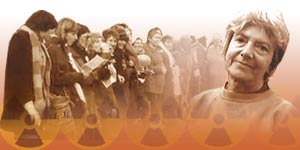En español
 Evelyn Parker: 'Greenham women succeeded'
Evelyn Parker: 'Greenham women succeeded'
 Here is an interview the BBC made Evelyn: BBC NEWS - Wednesday, 10 November, 1999
Here is an interview the BBC made Evelyn: BBC NEWS - Wednesday, 10 November, 1999 ![]() Added key words before the paragraphs - translate into Spanish and then link from different sections here: life at camp.
Added key words before the paragraphs - translate into Spanish and then link from different sections here: life at camp.
Evelyn Parker was one of a handful of local people to offer full-time support to the women of the peace camp at Greenham.
Supporting Camp
A smallholder in a village near Newbury, Ms Parker told BBC News Online that she never lived at the camp. "That really didn't seem to be a sensible thing to do," she said, "I lived very close to the camp and my home and its facilities were useful resources to the women who had made the decision to live at Greenham. There weren't things like mobile phones in general use in the early 80s, so our having a phone was useful in relaying messages and things like that. Our home was also somewhere that women could come and have a bath if they wanted to - and they would leave their vehicles and caravans on our land when they needed to."
Organization
She said that the day to day running of the peace camp was "entirely anarchic".
"It was a group of women deciding things amongst themselves, talking together as women," she said. "There were jobs that had to be done, but there were no rotas, or people being told what to do - people did them as and when they felt they ought to. If you felt that someone wasn't pulling their weight, then you sat down and talked to them about it and they had an opportunity to say, well, I'm not doing anything today because I'm pre-menstrual, or whatever."
Evictions
She said that in the early days of the camp, the women built fairly solid structures in which to live and meet. But after the bailiffs came and tore it all down, she said that the women chose from that point on to build temporary structures which could be moved and shifted at very little notice. She said: "The bailiffs were at the time empowered to remove the women's things from the land around the fence, but if you managed to get your things onto the highway, then they could not take them away. So you would get the word that the bailiffs were on the way and there would be this scramble to get your things into prams and supermarket trolleys and wheel them down onto the highway, and the bailiffs couldn't do anything to you then."
Actions
She explained that she had difficulty at first in taking part in activities like breaking into the base. "I had a problem in dissociating people and property, but I came to understand that this fence was just a thing and had been put there by men, and I had just accepted that as being normal whereas it was not normal at all. We had a code for bolt croppers - we used to call them black cardigans - so that the police didn't immediately know what we planned to do and stop us before we had started. There would be a message passed around to get the bcs or black cardigans, and we would take down parts of the fence or just enough to get in."
Ms Parker said the fine at the time for trespassing on the base was £25, and so each time someone had a birthday, their present from the rest of the women would be the £25 to enter the base. "One woman had a roller skating birthday on the runway - another went in on her birthday and laid lots of plastic yellow ducks on the runway." On other occasions the women would enter the base and dance on the silos.
Quakers
Ms Parker says she and her husband have been involved in the peace movement for a number of years. She said: "I am a Quaker and it is a part of my personal belief that nuclear weapons are wrong - you are talking about a weapon that not only kills your enemies, but your enemy's neighbours and their children when the radioactive fallout blows over them."
Ending Assessment
She said that she believes that although the weapons which were removed were ultimately recycled, she believes that Greenham women succeeded on several levels: "I think it is fair to say that we provided a role model for non-violent direct action. The people who are tearing up genetically modified food crops today are doing what we did 15 years ago. We also succeeded in fostering a women-only environment, where women learned that they didn't need to speak or act on men's terms. I still carry that with me from Greenham, and younger women are now hearing about that from me." She said that another remarkable aspect of the peace camp was that it did not damage the environment, or leave anything behind it: "I used to go walking in the land around where Blue Gate was, because that had special meaning for me. After a few months, there was nothing to suggest that it had ever been there at all. Women lived there for years - they lived hygienically, improvising showers and building shit pits - but when they left, there was no sign that they had been there."
"Greenham women achieved a whole lot of things in terms of feminism and in terms of making people as a whole more aware of the issues surrounding nuclear weapons."
